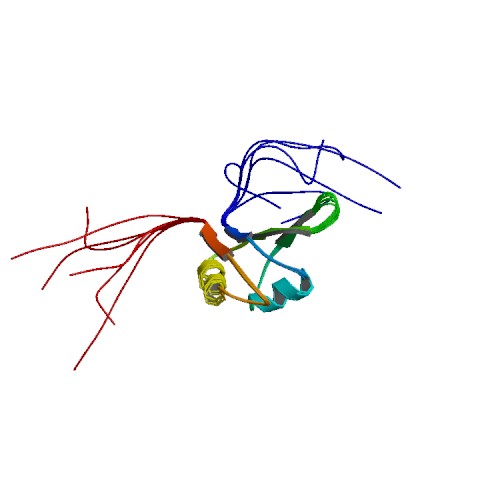HNRPH1
| Heterogeneous nuclear ribonucleoprotein H1 (H) | |||||||||||||
|---|---|---|---|---|---|---|---|---|---|---|---|---|---|
 PDB rendering based on 1wez. | |||||||||||||
| |||||||||||||
| Identifiers | |||||||||||||
| Symbols | HNRPH1 ; DKFZp686A15170; HNRPH; hnRNPH | ||||||||||||
| External IDs | Template:OMIM5 Template:MGI HomoloGene: 31318 | ||||||||||||
| |||||||||||||
| RNA expression pattern | |||||||||||||
 | |||||||||||||
 | |||||||||||||
| More reference expression data | |||||||||||||
| Orthologs | |||||||||||||
| Template:GNF Ortholog box | |||||||||||||
| Species | Human | Mouse | |||||||||||
| Entrez | n/a | n/a | |||||||||||
| Ensembl | n/a | n/a | |||||||||||
| UniProt | n/a | n/a | |||||||||||
| RefSeq (mRNA) | n/a | n/a | |||||||||||
| RefSeq (protein) | n/a | n/a | |||||||||||
| Location (UCSC) | n/a | n/a | |||||||||||
| PubMed search | n/a | n/a | |||||||||||
Heterogeneous nuclear ribonucleoprotein H1 (H), also known as HNRPH1, is a human gene.[1]
This gene belongs to the subfamily of ubiquitously expressed heterogeneous nuclear ribonucleoproteins (hnRNPs). The hnRNPs are RNA binding proteins and they complex with heterogeneous nuclear RNA (hnRNA). These proteins are associated with pre-mRNAs in the nucleus and appear to influence pre-mRNA processing and other aspects of mRNA metabolism and transport. While all of the hnRNPs are present in the nucleus, some seem to shuttle between the nucleus and the cytoplasm. The hnRNP proteins have distinct nucleic acid binding properties. The protein encoded by this gene has three repeats of quasi-RRM domains that bind to RNAs. It is very similar to the family member HNRPF. This gene is thought to be potentially involved in hereditary lymphedema type I phenotype.[1]
References
Further reading
- Rasmussen HH, van Damme J, Puype M; et al. (1993). "Microsequences of 145 proteins recorded in the two-dimensional gel protein database of normal human epidermal keratinocytes". Electrophoresis. 13 (12): 960–9. PMID 1286667.
- Dawson SJ, White LA (1992). "Treatment of Haemophilus aphrophilus endocarditis with ciprofloxacin". J. Infect. 24 (3): 317–20. PMID 1602151.
- Honoré B, Rasmussen HH, Vorum H; et al. (1996). "Heterogeneous nuclear ribonucleoproteins H, H', and F are members of a ubiquitously expressed subfamily of related but distinct proteins encoded by genes mapping to different chromosomes". J. Biol. Chem. 270 (48): 28780–9. PMID 7499401.
- Matunis MJ, Xing J, Dreyfuss G (1994). "The hnRNP F protein: unique primary structure, nucleic acid-binding properties, and subcellular localization". Nucleic Acids Res. 22 (6): 1059–67. PMID 7512260.
- Gamberi C, Izaurralde E, Beisel C, Mattaj IW (1997). "Interaction between the human nuclear cap-binding protein complex and hnRNP F.". Mol. Cell. Biol. 17 (5): 2587–97. PMID 9111328.
- Chou MY, Rooke N, Turck CW, Black DL (1999). "hnRNP H is a component of a splicing enhancer complex that activates a c-src alternative exon in neuronal cells". Mol. Cell. Biol. 19 (1): 69–77. PMID 9858532.
- Evans AL, Brice G, Sotirova V; et al. (1999). "Mapping of primary congenital lymphedema to the 5q35.3 region". Am. J. Hum. Genet. 64 (2): 547–55. PMID 9973292.
- Honoré B, Vorum H, Baandrup U (1999). "hnRNPs H, H' and F behave differently with respect to posttranslational cleavage and subcellular localization". FEBS Lett. 456 (2): 274–80. PMID 10456323.
- Markovtsov V, Nikolic JM, Goldman JA; et al. (2000). "Cooperative assembly of an hnRNP complex induced by a tissue-specific homolog of polypyrimidine tract binding protein". Mol. Cell. Biol. 20 (20): 7463–79. PMID 11003644.
- Andersen JS, Lyon CE, Fox AH; et al. (2002). "Directed proteomic analysis of the human nucleolus". Curr. Biol. 12 (1): 1–11. PMID 11790298.
- Jurica MS, Licklider LJ, Gygi SR; et al. (2002). "Purification and characterization of native spliceosomes suitable for three-dimensional structural analysis". RNA. 8 (4): 426–39. PMID 11991638.
- Angenstein F, Evans AM, Settlage RE; et al. (2002). "A receptor for activated C kinase is part of messenger ribonucleoprotein complexes associated with polyA-mRNAs in neurons". J. Neurosci. 22 (20): 8827–37. PMID 12388589.
- Strausberg RL, Feingold EA, Grouse LH; et al. (2003). "Generation and initial analysis of more than 15,000 full-length human and mouse cDNA sequences". Proc. Natl. Acad. Sci. U.S.A. 99 (26): 16899–903. doi:10.1073/pnas.242603899. PMID 12477932.
- Li J, Hawkins IC, Harvey CD; et al. (2003). "Regulation of alternative splicing by SRrp86 and its interacting proteins". Mol. Cell. Biol. 23 (21): 7437–47. PMID 14559993.
- Ota T, Suzuki Y, Nishikawa T; et al. (2004). "Complete sequencing and characterization of 21,243 full-length human cDNAs". Nat. Genet. 36 (1): 40–5. doi:10.1038/ng1285. PMID 14702039.
- Honoré B, Baandrup U, Vorum H (2004). "Heterogeneous nuclear ribonucleoproteins F and H/H' show differential expression in normal and selected cancer tissues". Exp. Cell Res. 294 (1): 199–209. doi:10.1016/j.yexcr.2003.11.011. PMID 14980514.
- Brill LM, Salomon AR, Ficarro SB; et al. (2004). "Robust phosphoproteomic profiling of tyrosine phosphorylation sites from human T cells using immobilized metal affinity chromatography and tandem mass spectrometry". Anal. Chem. 76 (10): 2763–72. doi:10.1021/ac035352d. PMID 15144186.
- Beausoleil SA, Jedrychowski M, Schwartz D; et al. (2004). "Large-scale characterization of HeLa cell nuclear phosphoproteins". Proc. Natl. Acad. Sci. U.S.A. 101 (33): 12130–5. doi:10.1073/pnas.0404720101. PMID 15302935.
- Jin J, Smith FD, Stark C; et al. (2004). "Proteomic, functional, and domain-based analysis of in vivo 14-3-3 binding proteins involved in cytoskeletal regulation and cellular organization". Curr. Biol. 14 (16): 1436–50. doi:10.1016/j.cub.2004.07.051. PMID 15324660.
- Lin KT, Lu RM, Tarn WY (2004). "The WW domain-containing proteins interact with the early spliceosome and participate in pre-mRNA splicing in vivo". Mol. Cell. Biol. 24 (20): 9176–85. doi:10.1128/MCB.24.20.9176-9185.2004. PMID 15456888.
| This protein-related article is a stub. You can help Wikipedia by expanding it. |